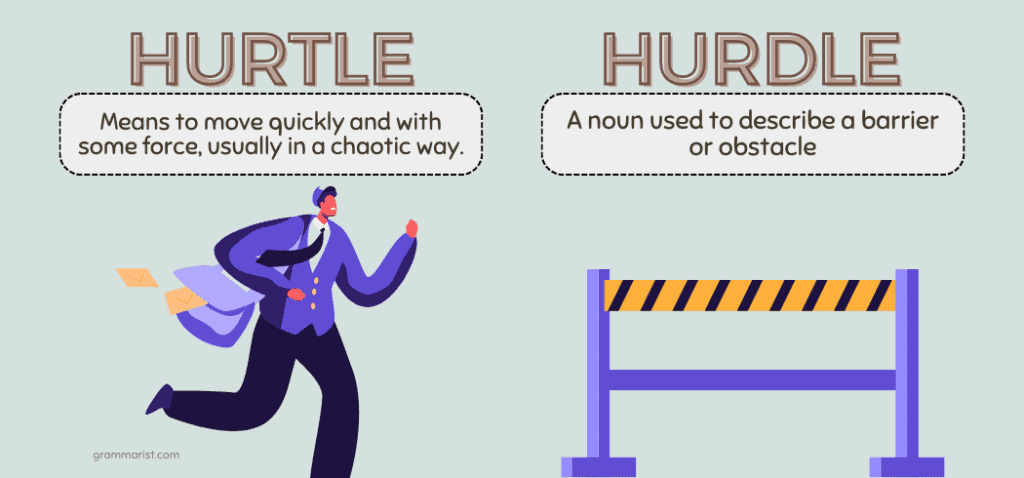Are “hurdle” and “hurtle” the same word with different spellings? No, absolutely not. While only a single letter separates them, their definitions are very different. So, let me explain what hurdle and hurtle mean and show you how you should be using both words.
Differences Between Hurdle vs. Hurtle

I’ll keep this brief and off the top.
- Hurtle: Move fast and hard
- Hurdle: A barrier or obstacle of some kind
Just remember this sentence, “You can hurtle through a hurdle.”
But “hurtle” can also be used to describe flinging something with a lot of force. In this case, it’s a synonym for the word “hurl.”
Hurtle Definition Explained
Now let’s take a moment to really look at their meanings. “Hurtle” is classed as a verb in English, which means to move quickly and with some force, usually in a chaotic or uncontrolled way.
It can also suggest a sense of urgency or recklessness, which kind of goes hand in hand with its definition. Looking at its various forms, “hurtles” is the third person singular, and “hurtled” is the past tense and past participle.
- Just hurtle through the crowd.
- He hurtles through the crowd.
- He hurtled through the crowd.
What Is a Hurdle?
Then we have the word “hurdle,” a noun used to describe a barrier or obstacle. We typically use it in sports, like track and field, where athletes jump over them during a race.
“Hurdling” is the gerund form of the noun hurdle, and you can use it to explain the action of jumping over hurdles.
Then “hurdled” is the past tense and past participle forms of the main verb “hurdle,” which you’d use to describe someone jumping over a hurdle or overcoming an obstacle.
Can Hurtle Be a Noun?
No, “hurtle” is and always will be a verb. It can’t function as a noun because it’s meant to describe the movement, and a noun is a person, place, or thing, not an action. But “hurdle” can be a noun when talking about the obstacles you jump over in a race.
Is Hurtle a Transitive Verb?
“Hurtle” can be both a transitive and intransitive verb. As a transitive verb, it needs a direct object, but as an intransitive verb, it doesn’t.
What Are the Synonyms for Hurtle?
- Rush
- Speed
- Bolt
- Dash
- Race
- Zoom
- Swoop
What Are the Synonyms for Hurdle?
- Barrier
- Obstacle
- Jump
- Block
- Wall
- Fence
- Blockade
- Stumbling block
- Impediment
Hurtle Examples in a Sentence

- The car hurtled down the highway at breakneck speeds—no wonder he got pulled over.
- I watched as the kids hurtled toward the playground with screams of excitement.
- Diane hurtled through the crowded market to catch the thief who stole her purse.
- We watched from our patio as the meteor hurtled through the atmosphere, creating a stunning light show in the sky.
- I hurtled the rock at the bear to scare it away but only angered it.
- The old train hurtled around the bend, barely staying on the tracks, creating sparks as it did.
Hurdle Examples in a Sentence
- The runner in the women’s 100-meter hurdle easily cleared the first hurdle during the track event race and bolted for the next one.
- My latest publishing project faced several hurdles before my editor could approve it.
- My daughter joined track and field and practiced hurdling daily to improve her technique.
- Jack hurdled the fence to escape from the angry dog.
- The team worked together to overcome several hurdles that came up while finishing the job.
Bottom Line
There you go! “Hurdle” is a noun, and “hurtle” is a verb, for the most part. And just remember my sentence trick, “You can hurtle through a hurdle,” and you’ll never get them mixed up again!

Comments are closed.